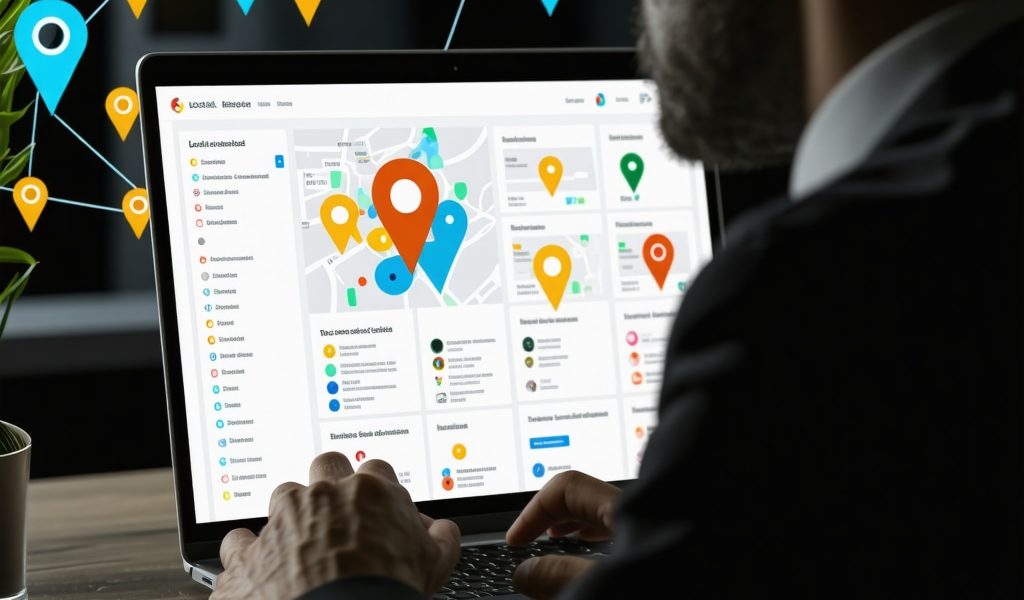Why Your Google My Business Citations Might Be Your Local SEO’s Best-Kept Secret
Imagine your business as a hidden gem in a bustling city. You know the value, the charm, but the world outside your neighborhood? Not so much. That’s where Google My Business (GMB) citations come in, acting like a megaphone that broadcasts your presence across the local search landscape. Citations—mentions of your business name, address, and phone number (NAP) on other websites—are the unsung heroes of local SEO, building trustworthiness and authority that Google simply can’t ignore.
From my years of diving into local SEO trenches, I’ve seen businesses transform overnight just by tidying up their citations. When your NAP is consistent, complete, and sprinkled across authoritative directories, you’re essentially sending Google a clear, confident message: “This business is legit, relevant, and ready to serve.” And yes, that clarity can skyrocket your visibility.
Can a Citation Slip-Up Really Tank Your Local Rankings?
Is your citation management more chaotic than a downtown street on a Friday night?
Think about it: a mismatched phone number here, an outdated address there, or even a rogue spelling variation can confuse search engines. Google hates confusion—it’s like trying to find a cafe that keeps changing locations; you’d give up, wouldn’t you? Inconsistent citations can dilute your local SEO efforts, making it harder for potential customers to find you in those coveted “near me” searches.
Consistency is king. As per Moz’s authoritative guide on local citations, citation accuracy directly influences your local search ranking. So, managing your GMB citations isn’t just a task; it’s a strategic move that can make or break your local search presence.
How to Master Your GMB Citation Management Without Losing Your Mind
First things first: audit your existing citations. Tools like BrightLocal or Whitespark can help you spot inconsistencies and duplicate listings that sabotage your SEO. Next, ensure your NAP details are not just consistent but also optimized with relevant keywords that align with what your potential customers are searching for.
Don’t underestimate the power of niche-specific directories and local chambers of commerce websites—they add credibility like a trusted referee vouching for you. And while you’re at it, keep your GMB profile fresh and engaging by following best practices for Google Business Listing optimization to maximize impact.
Ready to Level Up? Share Your Citation Success Stories!
If you’ve wrestled with the chaos of managing GMB citations or discovered a nifty trick to boost your local rankings, I’d love to hear from you. Drop a comment below or join the conversation on how citation management has reshaped your local SEO journey. For a deep dive into proven strategies, check out our expert guide on mastering GMB citation management.
Unraveling the Hidden Power of Niche Citations in Local SEO
While mainstream directories like Yelp, Yellow Pages, and TripAdvisor are vital, niche-specific citations often hold untapped potential. They provide laser-focused relevance, allowing your business to shine within industry-specific ecosystems. For example, a local vegan restaurant would benefit immensely from citations on plant-based or vegan diet websites, forums, and community blogs. These hyper-relevant signals not only bolster your authority but also attract a more qualified audience, increasing conversion rates.
Moreover, these niche citations often come from sources with high domain authority and topical relevance, which amplifies the trustworthiness signals sent to Google. This strategic layering of citations can create a robust local SEO profile that is both broad in reach and precise in targeting, a combination that many businesses overlook.
Leveraging Automated Citation Management Tools: Friend or Foe?
In the fast-paced realm of local SEO, automation tools such as Moz Local, BrightLocal, and Synup can streamline citation building and monitoring. These platforms offer centralized dashboards to detect inconsistencies, update NAP details, and submit your business information to multiple directories simultaneously. However, a critical question arises: Can automation fully replace the nuanced, human approach required for citation accuracy and strategic placement?
While automation significantly reduces manual workload and errors, over-reliance can lead to generic or irrelevant citations that dilute your SEO impact. Human oversight remains essential, especially when tailoring citations for niche markets or managing conflicting data. The key is to blend automation with expert manual review — a hybrid strategy that maximizes efficiency without compromising quality.
How Do You Balance Automation with Personalized Citation Strategies for Maximum Local SEO Impact?
This question strikes at the heart of modern local SEO practice. Striking the right balance involves leveraging automation for routine tasks like bulk submissions and monitoring, while reserving human expertise for strategic citation selection and custom optimizations. Businesses that master this balance often outperform competitors who rely solely on either manual or automated methods.
Incorporating this balanced approach can be complemented by following detailed frameworks like the step-by-step GMB citation management for SEO authority guide, which outlines practical tactics for enhancing citation quality and consistency.
Contextualizing Citations with Local Content: An Untapped Synergy
Another advanced tactic involves integrating citations with locally-focused content marketing. Embedding your NAP within relevant blog posts, community event pages, or local news stories can create powerful contextual signals that boost your GMB profile’s authority. For instance, a home services company participating in a neighborhood clean-up might get featured on local news sites or community blogs with accurate citations included.
This strategy not only enhances citation diversity but also improves local relevance and engagement metrics, which Google increasingly values. It’s a holistic approach that aligns citation management with broader content marketing efforts, creating a synergistic effect on your local search rankings.
Authoritative Insight on Citation Impact from Industry Leaders
As Search Engine Land emphasizes, “Local citations remain a critical ranking factor in Google’s local search algorithm, especially when they are consistent, accurate, and supplemented with strong local content.” This authoritative perspective reinforces the need for meticulous citation management combined with strategic content initiatives to dominate local search results.
For businesses eager to deepen their local SEO expertise, exploring resources like our expert guide on mastering GMB citation management offers comprehensive frameworks and actionable insights.
Join the Conversation: What’s Your Citation Strategy for 2025?
Have you experimented with niche citation platforms or integrated local content strategies to elevate your Google My Business presence? Share your experiences and innovative tactics in the comments below. Your insights could inspire fellow local businesses striving to enhance their citation management and local SEO success. Don’t forget to share this article with colleagues who are keen to unlock the full potential of GMB citations and check out our in-depth coverage on how to optimize your Google Business Listing effectively for further growth tips.
Harnessing the Power of Structured Data: The Next Frontier in Citation Optimization
As local SEO evolves, one of the most potent yet underutilized tools at your disposal is structured data markup. By embedding schema.org-based markup on your website, you provide search engines like Google with explicit clues about your business’s name, address, phone number, and even operating hours. This semantic clarity not only enhances the accuracy of your citations but also amplifies your Google My Business profile’s authority.
Implementing structured data requires a nuanced understanding of JSON-LD syntax and the specific LocalBusiness schema. Proper application ensures that your citations are machine-readable and seamlessly integrated with local search algorithms, reducing ambiguity and boosting your chances of appearing in the coveted local pack.
How Does Structured Data Influence Google My Business Citation Relevance and Ranking?
Structured data acts as a beacon, signaling to Google precisely who you are and what you offer. When combined with consistent citations across authoritative platforms, it creates a multi-layered trust framework that is difficult for competitors to replicate. However, it’s not just about adding markup—it’s about ensuring that your structured data is accurate, complete, and synchronized with your GMB profile and external citations.
Recent case studies from Search Engine Land highlight businesses that saw a 20-30% uplift in local search visibility after integrating structured data with citation management, underscoring its transformative potential.
Deep Dive: Navigating the Complexities of Citation Clean-Up in Multi-Location Businesses
For enterprises managing multiple storefronts or service areas, citation consistency becomes exponentially complex yet even more critical. Each location demands its own distinct but harmonized citation footprint to avoid cannibalization and confusion. The process involves meticulous auditing to identify duplicate or conflicting listings, followed by strategic consolidation and verification.
Employing advanced local SEO tools that allow segmented citation management per location, like Whitespark’s multi-location dashboard, can streamline this labor-intensive process. Moreover, integrating location-specific landing pages rich in localized content further strengthens the citation ecosystem by reinforcing geographical relevance.
Elevating Citation Quality Through Strategic Partnerships and Community Engagement
Beyond standard directories, collaborating with influential local organizations, sponsorships, and event partnerships can generate high-quality, contextually rich citations. These citations often appear on reputable local news outlets, business associations, and niche community platforms, providing authoritative backlinks that elevate your GMB profile’s trust signals.
For example, a boutique fitness studio sponsoring a regional marathon might secure citations on event websites, local news coverage, and participant blogs, weaving a rich tapestry of location-specific references. This strategy not only diversifies your citation profile but also enhances brand visibility and community goodwill.
Advanced Monitoring: Leveraging AI to Detect Citation Drift and Maintain Data Integrity
Maintaining citation accuracy over time is a dynamic challenge, particularly with frequent business changes or external data aggregation errors. Cutting-edge AI-powered monitoring tools are emerging to proactively detect “citation drift”—subtle inconsistencies or unauthorized modifications in your NAP details across the web.
These intelligent systems utilize pattern recognition and anomaly detection algorithms to alert you promptly, enabling swift corrections before they impact your SEO. Integrating such technology with your citation management workflow ensures your local SEO foundation remains rock-solid and responsive to changes.
Call to Action: Embrace the Future of GMB Citation Mastery
Ready to future-proof your local SEO strategy? Delve deeper into structured data implementation, multi-location citation harmonization, and AI-driven monitoring by exploring our comprehensive resources. Harness these advanced tactics to transform your Google My Business citations from mere listings into powerful local search assets. Engage with us through comments or consultation requests to tailor these strategies for your unique business landscape.
How Will AI and Voice Search Revolutionize GMB Citation Strategies?
The advent of artificial intelligence and the meteoric rise of voice search are reshaping the local SEO landscape, compelling businesses to rethink their Google My Business (GMB) citation tactics. Voice assistants like Google Assistant and Alexa prioritize precise, consistent, and contextually relevant data to deliver quick, trustworthy answers to user queries. This means that your citation accuracy and semantic clarity are no longer just SEO niceties—they’re vital for capturing voice-driven traffic.
AI-powered algorithms increasingly analyze patterns beyond mere NAP consistency, factoring in user engagement metrics and citation sentiment. Consequently, integrating AI insights into your citation management can proactively flag inaccuracies and optimize listings to align with evolving voice search nuances. Exploring proven GMB citation management tips can offer practical frameworks to harness these emerging trends.
What Are the Best Practices for Synchronizing GMB Citations with AI-Driven Search Algorithms?
Best practices include implementing structured data markup to feed AI with rich, machine-readable information, continually auditing citations with AI-enhanced tools, and maintaining a dynamic citation ecosystem that reflects real-time business changes. Additionally, embedding localized and conversational keywords in citation descriptions can align your listings with natural language queries typical of voice search.
According to Search Engine Land, “Businesses that integrate AI-aware citation strategies and voice search optimization are poised to outperform competitors in the rapidly evolving local search arena.” This underscores the urgency of adopting forward-thinking citation tactics.
Decoding the Role of Citation Sentiment Analysis in Local SEO Success
Citation sentiment analysis is an innovative frontier where the qualitative aspects of mentions—tone, context, and user perception—are quantified to influence local rankings. Positive sentiment citations, especially on authoritative platforms, reinforce trustworthiness and brand reputation, while negative or neutral mentions may require strategic management.
Incorporating sentiment analysis tools into your citation audit enables a more nuanced understanding of how your business is perceived across the web. This advanced insight facilitates targeted outreach, reputation management, and citation refinement, elevating your local SEO beyond traditional metrics.
Can Sentiment-Driven Citation Strategies Influence Google My Business Rankings?
Emerging evidence suggests that Google’s algorithms increasingly consider user experience signals, including sentiment derived from reviews and mentions, as part of their local ranking factors. Businesses that proactively cultivate positive citation sentiment by engaging with local communities and encouraging authentic mentions tend to see improved visibility.
For businesses aiming to leverage these insights, our expert GMB citation services offer tailored strategies that blend sentiment management with citation optimization for maximum impact.
Engage and Share: How Are You Preparing Your GMB Citations for the Next Wave?
As local SEO hurtles toward an AI-augmented, voice-first future, your citation strategy must evolve in tandem. Are you integrating AI tools, voice search optimization, or sentiment analysis into your GMB citation management? Share your experiences, challenges, or innovative tactics in the comments below. Your insights could be the catalyst for others striving to master the art of future-proof local SEO. For a comprehensive roadmap, explore our master guide on GMB citation management and stay ahead in the game.
Expert Insights & Advanced Considerations
Strategically Harmonize Citation Consistency with Localized Content
While maintaining consistent NAP citations remains foundational, integrating these citations within locally relevant content amplifies their SEO power. Embedding your business details into neighborhood blogs, event pages, or local news articles not only diversifies citation sources but also increases engagement signals that Google values. This nuanced approach enhances both authority and relevance, creating a citation ecosystem that resonates authentically with your target community.
Balance Automation with Expert Oversight for Sustainable Citation Quality
Automation tools streamline citation submissions and monitoring, but without expert human review, they risk generating generic or inconsistent listings. The optimal strategy involves leveraging AI-powered platforms for bulk management while applying manual audit and customization to ensure citation precision and niche relevance. This hybrid approach safeguards citation integrity and maximizes local SEO impact, especially in competitive markets or multi-location scenarios.
Leverage Structured Data Markup as a Semantic Beacon for GMB Citations
Incorporating schema.org LocalBusiness structured data on your website provides explicit, machine-readable confirmation of your business’s identity and details. This semantic clarity works synergistically with external citations to build a robust trust framework that search engines rely on. Properly implemented JSON-LD markup reduces ambiguity, helping your Google My Business profile stand out in local pack results and voice search queries alike.
Integrate Sentiment Analysis into Citation Management for Reputation Leverage
Emerging SEO trends indicate that Google increasingly accounts for the qualitative sentiment of citations and mentions. Positive sentiment amplifies trust signals, while negative or neutral mentions may dampen your local authority. Employing sentiment analysis tools enables proactive reputation management, allowing you to fine-tune your citation strategy by prioritizing high-value, positively perceived platforms and engagements.
Address Multi-Location Citation Complexity with Segmented and Tailored Strategies
Managing citations across multiple business locations necessitates granular auditing and customized citation footprints for each site. Avoiding duplicate or conflicting listings prevents cannibalization and confusion. Utilizing specialized tools with multi-location dashboards, combined with localized landing pages rich in unique content, fortifies citation relevance and boosts individual storefront rankings.
Curated Expert Resources
- Search Engine Land – Local Citations and Structured Data Insights: A definitive source for evolving SEO algorithms and their interplay with citations and structured data, offering deep dives into practical applications and case studies.
- Moz’s Local SEO Learning Center: Provides foundational to advanced educational materials on citation building, management, and best practices, ideal for refining citation accuracy and authority.
- BrightLocal Blog and Tools: Essential for hands-on citation audits and monitoring, coupled with actionable guides on maintaining citation consistency and leveraging local SEO tools effectively.
- RankingSEOgmb.com Expert Guides: Comprehensive, step-by-step frameworks specifically focused on mastering GMB citation management, optimization techniques, and advanced local SEO strategies tailored for 2025 and beyond.
- Schema.org Documentation – LocalBusiness Schema: Authoritative technical resource for implementing structured data markup correctly, crucial for semantic SEO and enhancing GMB citation clarity.
Final Expert Perspective
Navigating the complexities of Google My Business citation management demands a multifaceted approach that blends consistency, contextual relevance, and technological sophistication. By harmonizing accurate citations with localized content, leveraging structured data, and integrating sentiment and AI-powered insights, businesses can transform citations from mere directory entries into strategic assets that powerfully elevate local search authority. For those ready to deepen their expertise, exploring advanced resources like our master GMB citation management guide and adopting a hybrid automation-expert strategy will be pivotal steps toward dominating local SEO landscapes. Engage with the community, share your insights, and continue evolving your citation tactics to stay ahead in this dynamic field.





The analogy of GMB citations acting like a megaphone that broadcasts your presence locally really resonates with my experience. I once managed a small local shop where inconsistent NAP details across directories significantly limited visibility. After a thorough audit using tools like BrightLocal, and focusing on niche citations relevant to our industry, we saw a noticeable jump in local search rankings within weeks. Consistency truly is king—Google’s algorithm seems to reward that trustworthiness it can easily verify. However, I’ve found balancing automation with manual checks to be tricky. Automated tools speed up the process but sometimes introduce inaccurate listings, so a hybrid approach is vital. I’m curious, have others encountered pitfalls relying too much on automation for citation management? How do you strike the right balance without overwhelming your resources? Also, integrating local content with citations feels like a synergistic move, but I wonder how feasible it is for very small businesses to maintain fresh content regularly. Would love to hear how others manage that challenge or prioritize their citation strategies.
This post really hits home on the importance of citations for local SEO. I’ve personally seen how just cleaning up inconsistent NAP data across key directories can lead to immediate improvements in local rankings, especially when combined with targeted niche citations. It’s like giving Google a clear roadmap to your business. What fascinates me is how integrating citations with locally relevant content can amplify their impact. I’ve started tagging citations within blog posts and community event pages, which seems to boost engagement signals and gives Google more contextual confidence. Has anyone else experimented with this approach? Additionally, I wonder about the optimal frequency for updating or confirming citations—how often should businesses audit their listings to stay ahead without overdoing it? With AI tools making automation easier, I’m curious how others balance automated processes with manual oversight to avoid irrelevant or conflicting citations. Combining these strategies seems to be the key, but managing it effectively in multi-location scenarios can be tricky. Would love to hear how others are integrating structured data or leveraging community partnerships to enhance their citation profiles for 2025!